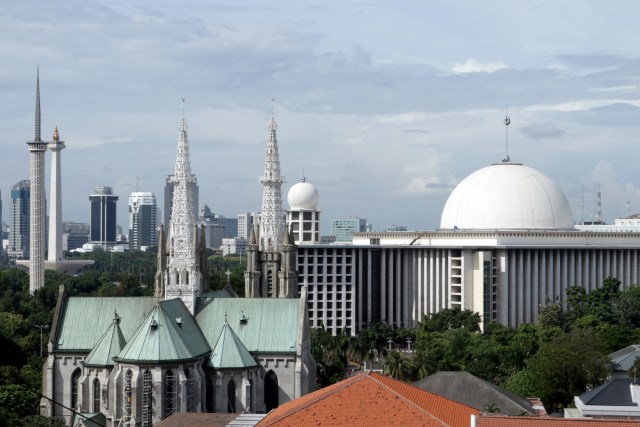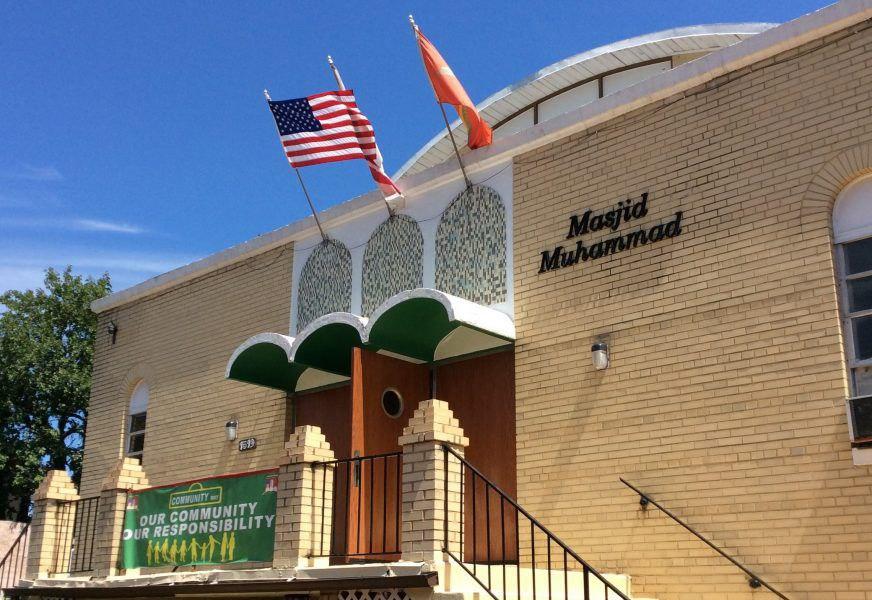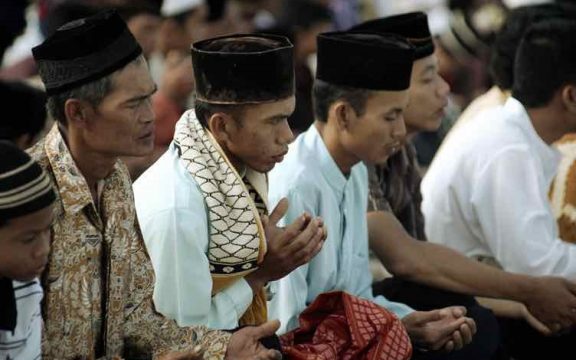My teacher as well as my colleague, al-ustadz Yusuf Mansur, asked me some issues regarding a Muslim entering the church. Recently, there have been figures who say, “Muslims who enter the church has conducted a type of apostasy.” What is the actual legal status for Muslims entering the church? It’s a good opportunity for me to write this down and share it with others.
Actually, there is no prohibition in the Qur’an and the Hadith which expressly forbids Muslims from entering churches or other places of worship. Therefore, this case has entered the area of interpretation among the scholars. That is why the scholars differed on its legal status.
I quote information from the book of Mausu’ah Fiqh of Kuwait. This book is an encyclopedia of fiqh issues from various schools of thought. Here is the explanation:
يَرَى الْحَنَفِيَّةُ أَنَّهُ يُكْرَهُ لِلْمُسْلِمِ دُخُول الْبِيعَةِ وَالْكَنِيسَةِ، لأَِنَّهُ مَجْمَعُ الشَّيَاطِينِ، لاَ مِنْ حَيْثُ إِنَّهُ لَيْسَ لَهُ حَقُّ الدُّخُول. وَذَهَبَ بَعْضُ الشَّافِعِيَّةِ فِي رَأْيٍ إِلَى أَنَّهُ لاَ يَجُوزُ لِلْمُسْلِمِ دُخُولُهَا إِلاَّ بِإِذْنِهِمْ، وَذَهَبَ الْبَعْضُ الآْخَرُ فِي رَأْيٍ آخَرَ إِلَى أَنَّهُ لاَ يَحْرُمُ دُخُولُهَا بِغَيْرِ إِذْنِهِمْ. وَذَهَبَ الْحَنَابِلَةُ إِلَى أَنَّ لِلْمُسْلِمِ دُخُول بِيعَةٍ وَكَنِيسَةٍ وَنَحْوِهِمَا وَالصَّلاَةَ فِي ذَلِكَ، وَعَنْ أَحْمَدَ يُكْرَهُ إِنْ كَانَ ثَمَّ صُورَةٌ، وَقِيل مُطْلَقًا، ذَكَرَ ذَلِكَ فِي الرِّعَايَةِ، وَقَال فِي الْمُسْتَوْعِبِ: وَتَصِحُّ صَلاَةُ الْفَرْضِ فِي الْكَنَائِسِ وَالْبِيَعِ مَعَ الْكَرَاهَةِ، وَقَال ابْنُ تَمِيمٍ. لاَ بَأْسَ بِدُخُول الْبِيَعِ وَالْكَنَائِسِ الَّتِي لاَ صُوَرَ فِيهَا، وَالصَّلاَةِ فِيهَا. وَقَال ابْنُ عَقِيلٍ: يُكْرَهُ كَالَّتِي فِيهَا صُوَرٌ، وَحَكَى فِي الْكَرَاهَةِ رِوَايَتَيْنِ. وَقَال فِي الشَّرْحِ. لاَ بَأْسَ بِالصَّلاَةِ فِي الْكَنِيسَةِ النَّظِيفَةِ رُوِيَ ذَلِكَ عَنِ ابْنِ عُمَرَ وَأَبِي مُوسَى وَحَكَاهُ عَنْ جَمَاعَةٍ، وَكَرِهَ ابْنُ عَبَّاسٍ وَمَالِكٌ الصَّلاَةَ فِي الْكَنَائِسِ لأَِجْل الصُّوَرِ
From the above explanation, there are at least four different opinions among scholars.
First, the ‘ulama from Hanafi schools believed that it is hated (makruh) for a Muslim to enter the synagogue and the church.
Second, some of the Shafi’i scholars hold that it is not allowed for Muslims to enter a non-Muslim place of worship unless they have permission. Some of the other Shafi’ite religious scholars believe that it is not forbidden to enter non-Muslim places of worship even without their permission.
Third, the ‘ulama from Hanbali schools believed that it is allowed for Muslim to enter synagogues and churches, and other houses of worship, and even to pray in them. However, according to Imam Ahmad, the the practice is hated (makruh) if there is a picture inside.
Fourth, Ibn Tamim believed that it is permitted to enter synagogues and churches if there is no picture in it, as well as to conduct prayer in it. Ibn Aqil argued that it is hated (makruh) because there is a picture. There are two opinions regarding this issue: some say it is permitted to pray in the church based on the history of the companions of the Prophet, Ibn Umar and Abu Musa, as told by many scholars, and there was also a narrative from Ibn Abbas and Malik that prayer in the church is hated (makruh) when there is a picture.
The above explanation is located in chapter 20, page 245. In chapter 38, page 155 from in the same book, there is an additional statement:
وَيَرَى الْمَالِكِيَّةُ وَالْحَنَابِلَةُ وَبَعْضُ الشَّافِعِيَّةِ أَنَّ لِلْمُسْلِمِ دُخُول بِيعَةٍ وَكَنِيسَةٍ وَنَحْوِهِمَا
“Maliki, Hanbali, and some Shafi’i scholars believed that it is permitted for Muslims to enter synagogues, churches and other places of worship.”
Look, we are still debating whether to enter the church or not, the previous scholars have even discussed whether prayer can be in the church. As noted above, they said that the prayer (in the church) is valid, some of them even absolutely allow it, and some of them said it is legal but can be hated (makruh) if there is a picture in the church.
We will add by quoting one comparative book of fiqh from another school, namely the book of al-Mughni by Ibn Qudamah.
In chapter 2, page 57, he wrote:
فَصْلٌ الصَّلَاةِ فِي الْكَنِيسَةِ النَّظِيفَة
فَصْلٌ: وَلَا بَأْسَ بِالصَّلَاةِ فِي الْكَنِيسَةِ النَّظِيفَةِ، رَخَّصَ فِيهَا الْحَسَنُ وَعُمَرُ بْنُ عَبْدِ الْعَزِيزِ وَالشَّعْبِيُّ وَالْأَوْزَاعِيُّ وَسَعِيدُ بْنُ عَبْدِ الْعَزِيزِ (٩٦٩) وَرُوِيَ أَيْضًا عَنْ عُمَرَ وَأَبِي مُوسَى، وَكَرِهَ ابْنُ عَبَّاسٍ وَمَالِكٌ الْكَنَائِسَ؛ مِنْ أَجْلِ الصُّوَرِ. وَلَنَا «، أَنَّ النَّبِيَّ – صَلَّى اللَّهُ عَلَيْهِ وَسَلَّمَ – صَلَّى فِي الْكَعْبَةِ وَفِيهَا صُوَرٌ» ، ثُمَّ هِيَ دَاخِلَةٌ فِي قَوْلِهِ – عَلَيْهِ السَّلَامُ -: «فَأَيْنَمَا أَدْرَكَتْكَ الصَّلَاةُ فَصَلِّ، فَإِنَّهُ مَسْجِدٌ»
Ibn Qudamah explained that al-Hasan, Umar bin Abdul Azis, Sya’bi, Awza’i and Sa’id bin Abdul Azis, as well as the narrations from Umar bin Khattab and Abu Musa, said that it is not forbidden to conduct prayer in a clean church. Ibn Abbas and Malik stated it is hated (makruh) because there is a picture in the church. However, for us (Ibn Qudamah and scholars who agree with him) the Prophet had prayed in the Kaaba and in it there were pictures. This was also included in the Prophet’s words: “If the prayer time has arrived, do prayers wherever because wherever is a mosque.”
Ibn Qudamah also quoted an interesting story in chapter 7, page 283:
وَرَوَى ابْنُ عَائِذٍ فِي ” فُتُوحِ الشَّامِ “، أَنَّ النَّصَارَى صَنَعُوا لَعُمَرَ – رَضِيَ اللَّهُ عَنْهُ -، حِينَ قَدِمَ الشَّامَ، طَعَامًا، فَدَعَوْهُ، فَقَالَ: أَيْنَ هُوَ؟ قَالُوا: فِي الْكَنِيسَةِ، فَأَبَى أَنْ يَذْهَبَ، وَقَالَ لَعَلِيٍّ: امْضِ بِالنَّاسِ، فَلِيَتَغَدَّوْا. فَذَهَبَ عَلِيٌّ – رَضِيَ اللَّهُ عَنْهُ – بِالنَّاسِ، فَدَخَلَ الْكَنِيسَةَ، وَتَغَدَّى هُوَ وَالْمُسْلِمُونَ، وَجَعَلَ عَلِيٌّ يَنْظُرُ إلَى الصُّوَرِ، وَقَالَ: مَا عَلَى أَمِيرِ الْمُؤْمِنِينَ لَوْ دَخَلَ فَأَكَلَ،
وَهَذَا اتِّفَاقٌ مِنْهُمْ عَلَى إبَاحَةِ دُخُولِهَا وَفِيهَا الصُّورُ، وَلِأَنَّ دُخُولَ الْكَنَائِسِ وَالْبِيَعِ غَيْرُ مُحَرَّمٍ
When Umar bin Khattab entered the land of Sham (current Syria), and it was known by the Christians of that country, they took the initiative to welcome Umar by serving him food. The food was served in their church. Then Umar refused to attend and instructed ‘Ali to replace him. ‘Ali came to the invitation, went inside and ate the food provided. Then Ali said: “I don’t know why Umar refused to come?” Ibn Qudamah said this is a proof that Prophet’s Companions agreed that entering the church or synagogue is not forbidden.
Well, someone might ask: why did Umar refuse to come? If it is forbidden, why did Umar send Ali? It seems that the reason Umar did not want to enter and attend a banquet at the church was because he was worried that Muslims would understand that they could take the church and turn it into a mosque. This was also what Umar did when he refused to enter the church in Palestine. Umar avoided damage and violence. However, it is clear that Imam Ali and his friends entered the church and attended the banquet in it.
Those are the explanation from the authoritative classical books so that we will not respond this case emotionally and not easy to judge our brothers who enter the church. The idea of this writing is not the answer from liberals, Shi’ites, orientalists, secularists or the like, but purely an answer from the books of fiqh based on the opinion of the scholars, and the practice of the Prophet and his companions. Let us respect the diverse opinions of our scholars.
Translated from the article in Indonesian version: https://islami.co/bolehkah-muslim-masuk-ke-gereja-ini-penjelasan-ulama-dan-kitab-fiqih/ by Nadirsyah Hosen on Islami.co, published on September 20, 2019.
![Islami[dot]co](https://en.islami.co/wp-content/themes/jambualas/images/logo.png)





